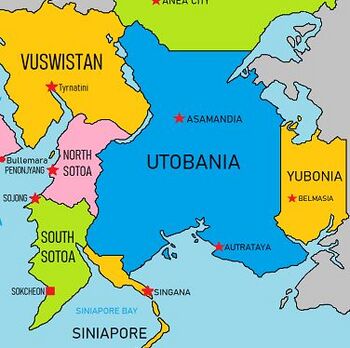Utobania: Difference between revisions
No edit summary |
|||
| Line 23: | Line 23: | ||
|leader_title1 = [[Chancellor of Utobania|Chancellor]] | |leader_title1 = [[Chancellor of Utobania|Chancellor]] | ||
|leader_name1 = [[Kennedy Telgado]] | |leader_name1 = [[Kennedy Telgado]] | ||
|leader_title2 = | |leader_title2 = [[Foreign Minister of Utobania|Foreign Minister]] | ||
|leader_name2 = | |leader_name2 = [[Kaitlin Belmana]] | ||
|sovereignty_type = | |sovereignty_type = | ||
|sovereignty_note = | |sovereignty_note = | ||
Revision as of 03:08, 2 August 2021
Republic of Utobania | |
|---|---|
|
Flag | |
 | |
| Capital | |
| Government | |
| Kennedy Telgado | |
| Kaitlin Belmana | |
| Population | |
• 2020 estimate | 46,839,000 |
| Currency | mark |
| Date format | mm-dd-yyyy |
The Republic of Utobania, most commonly known as Utobania, is a nation in the Coalition of Crown Albatross located on the continent of Nortua, bordered by North Sotoa, South Sotoa, New Anea, Siniapore, Yubonia and Vuswistan, with a maritime connection through the Epsilon Sea. The federal republic consists of thirteen states and three federal territories. Asamandia is the national capital and largest city while Autrataya is the seat of the federal government. With a population of over 46.8 million, Utobania is one of the most populous countries on Iearth.
Utobania has its origins in the Utobania kingdoms which, from the 18th century, became subject to the Constantio Empire, along with the Siniapore Straits Settlements protectorate and the Sotoas. Mainland continental Utobania was unified as the Utobanian Union in 1939. In 1963, Utobania combined with Siniapore, New Anea, and Yubonia and formed the United Federation of Utobania. In 1965, Singapore was expelled from the federation, followed by the independence of New Anea in 1978 after a separatist referendum and Yubonia in 1993 in a similar fashion.
The country is multi-ethnic and multi-cultural, which has a significant effect on its politics. About half the population is ethnically Utobanian, with large minorities of Siniaporeans, Sotoans, and indigenous peoples. The country's official language is Utobanian, while Caticeze-English remains an active second language. While recognising Christianity as the country's established religion, the constitution grants freedom of religion to non-Christians, with the country being composed with a sizable minority of 34% Muslim believers. The administrative capital, Autrataya, is the center for Muslim faith in the nation, while Asamandia serves as the center for Christian faith. It is considered a middle power, and is a member state of several international organizations such as the Coalition of Crown Albatross and the Sotoan Basin Union.

